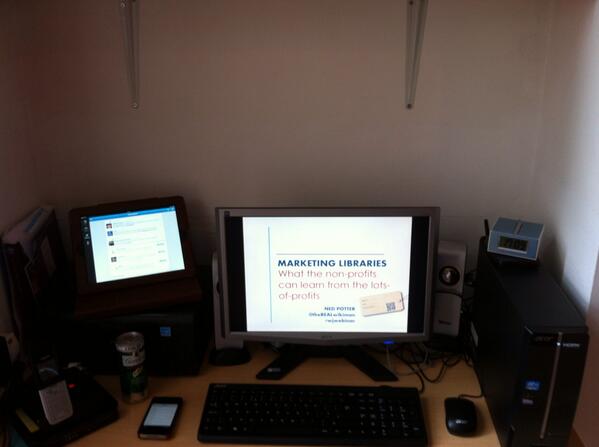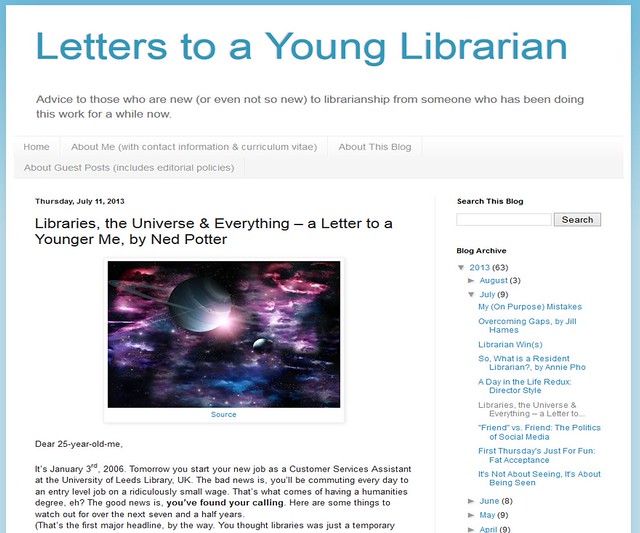A couple of weeks ago I presented a webinar for WebJunction on marketing libraries. Part 1 of this post is all the information from the presentation, including a video archive of it, and Part 2 is about the process of presenting in a webinar, for anyone interested in that side of things.
Part 1: Marketing Libraries
The webinar covered marketing principles (several ways to start thinking like a library marketer) - and marketing actions (ways to communicate including Word of Mouth, the website, social media etc). There are various ways you can access the content.
If you want a brief overview:
Here are the slides, with a couple of bits of info added in so they make sense without me talking over the top of them.
If you want the full detail:
You can view the full Archive (combined archive of audio, chat, and slides) - this requires JAVA and is a bit more technically complicated than the options above and below, but you get the full experience of the slides, me narrating them in real time, and the chat happening in real time, where you'll find lots of good ideas.
If you want a version you can watch on any device:
Here is the YouTube vid of the webinar - the good thing is you can watch this on a phone etc, the downside is some key points are missed where it skips or the live-streaming briefly went down, and it's hard to read the chat that added so much to the presentation. (You can, however, download the chat (xls) to read in Excel as you go along.)
When I get a bit of time I'm going to break this down into smaller videos on each topic.
Part 2: Presenting a Webinar
Presenting a webinar is an inherently odd experience because you can't see the faces and responses of your audience. I rely on this a lot to know what is working and what isn't - a presentation is all about communication, after all. Not only that but it's a much bigger audience than for a normal talk - there was nearly 600 people watching this as it happened.

Above is what my desk looked like - iPad to monitor tweetstream (which I didn't have the wherewithall to actually do), landline phone to speak into (I had it pressed against my ear for the first half hour before realising there was nothing to actually hear), G&T to drink (later decanted into a glass with ice, don't worry), iPhone to live-tweet pre-written draft tweets from (it was too stressful to do this well, so I sort of tweeted them in clumsy groups), PC to present from and clock to keep to time by.
I asked for some advice on Twitter about what makes a good webinar - much of it was about good presenting generally, but the web-specific stuff centered around making it as interactive as possible (the technology limited how much I could do this, but I tried...) and giving people time to catch up (I think I pretty much failed to do this). Very useful advice from Jennifer at Web Junction included not putting any animations on the slides because these don't render well in the webinar environment (if I wanted stuff to appear on a slide as I went along, I made two versions of the slide and moved between them). The particular platform we used meant I had to dial in with a phone - a PHONE! - and talk into that whilst manipulating the slides, that was very strange. I had a practice run the night before and I'm glad I did - in essence I found out I just cannot present sitting down, I need the energy that comes from pacing around, so I ended up using my slide-clicker so I could wonder about my house without having to be too close to the PC... The downside to this is I couldn't monitor the chat nearly as well as I wanted to, to respond to questions, because I often wasn't close enough to read the small text.
This was the first time I'd done one of these solo - previous webinar experience had been as part of a panel. As is often the case, as soon as I've done something properly and learned how it works, I want to do it again but much improved based on what I now know. So I'm hoping to work with WebJunction again next year (I find their site a really useful source of information and expert opinion). But the feedback from this one was great, some really nice comments in the chat and even a reference to my accent via private message...
I enjoyed this whole thing, and clearly live-streaming and web-based events are going to be more and more important. They're very convenient for attendees, less so for presenters (I had to banish my family upstairs for example!) but I did get to wear shorts for a presentation for the first time, and even drink Gin & Tonic during it, and that was ace.




